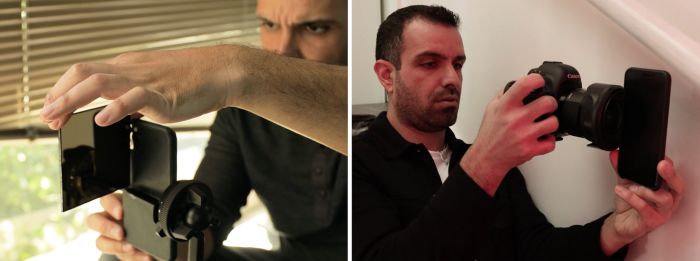As photographers, we sometimes rely too heavily on the gear we use to create visually compelling images. It’s easy, for example, to fall into the habit of leaning on shallow depth of field and bokeh to make a photo look interesting. However, we can use simple compositional techniques that will not only allow us to take better pictures, but also have fun while we’re doing it – in fact you can join us over on TikTok for more quick tips on this & more! Moreover, we can leave our fancy gear at home and create amazing imagery on our smartphone, which most of us carry at all times anyway.
In this video/article, you’ll find five photography composition tips that you can use with any camera, including your smartphone!
Video: 5 Photography Composition Tips to Use with Any Camera
Tip #1: Turn on Grids
Regardless of the camera you’re using (DSLR, mirrorless, or smartphone), you should be able to turn on a grid to help you line up your shots; consult your manual if necessary.

For those of you using your camera, be sure to access Lightroom Mobile, a powerful editing application for your phone (iPhone or Android) that you can download for free. What many people don’t know is that Lightroom mobile, in addition to being a great photo editing application, also has a powerful camera built into it. As illustrated in the images above, the camera and grid system is easy to locate within the app.
You’ll notice a variety of grids available, including a square overlay, the rule of thirds, and the golden ratio. I don’t use the square overlay much, but I use the other two options quite often. I recommend using these grids when you can, but don’t always lean on the rule of thirds for every single shot.
If you have a newer iPhone, you’ll find that you have these grids already built into the native camera application. All you need to do to access the grid is enable the “Grid” option under your camera settings on the phone. I actually recommend using your native camera app whenever possible.
Tip #2: Use Your Phone or an ND (Neutral Density) Filter to Create Reflections

If you’re not using your phone to capture images, you can still use it to create a reflection. Otherwise, square ND filters make great reflective surfaces when their not being used for their initial purpose. Reflections can be used to add visual interest to an image as well as conceal distracting elements in a scene. In the image below, I used an ND filter to create a reflection and conceal a light switch on the wall.

[Related Reading: 5 Creative Portraits in a Crappy Parking Lot]
Tip #3: Find a Person

When shooting a landscape image, one of my favorite things to do is include a person in the frame to add a sense of story and scale to the photo. In the image above, there’s a paddle boarder a couple hundred feet out in the water. I lowered the camera angle to photograph the paddle boarder against a clean sky, which allows us to more clearly see the form and shape of the subject’s body.
Bonus Tip: If you’re using your iPhone, rotate the phone so that the camera lens is on the bottom (closer to the rocks). Getting the lens close to the foreground elements helps add depth and visual interest to the image.
Tip #4: Embrace Minimalism
Minimalism stands as one of my favorite photography composition techniques because it demonstrates that what we choose to exclude from our frame is just as important as what we choose to include.

For example, if you look at the wide angle version of the image above, you can see there’s really no clear focal point or area of interest. It’s not a shot I’d want to print or hang on the wall. When I zoomed in, however, I created plenty of negative space in the shot and the minimalist image becomes a worthwhile photo. The negative space leads into the focal point of the image and leaves plenty of room to add copy or other design elements, depending on how you intend to use the image.
Tip #5: Look Up

This tip plays into the power of perspective, which steps away from always capturing images at eye level. When shooting at a location, remember to look up! You might find yourself in a beautiful area with plenty of options for snapping a great photo, but sometimes the best shot is waiting overhead. In the example above, I looked up to find a patio cover that created a juxtaposition of geometric and organic shapes when framed with a nearby palm tree. While a straightforward image of a palm tree has its place, I feel that this composition creates a more compelling photo.
[Related Reading: How to Get Creative with Perspective]
Conclusion
I hope you enjoyed these five photography composition tips that you can use with any camera. As phone cameras continue to improve and allow us to create high quality imagery, it’s worth getting creative and going beyond the boring imagery we tend to capture when using our phones. After all, challenging ourselves to take better pictures puts the fun back into taking them.
You can find more bite-sized tips on my TikTok (@bornuncreative) and Instagram (@pyejirsa) profiles, as well as SLR Lounge’s YouTube channel.





Get Connected!